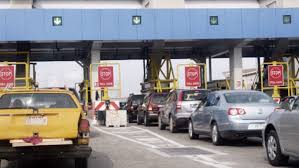Relief As Cashless Tolling Reduces Queue On Lekki-Ikoyi Bridge
Posted by Amarachi on Mon 20th Jan, 2020 - tori.ng
File Photo
Shorter travel time, ease of passage, and little or no traffic. This is the summary of the observations of some of the motorists who have been crossing the bars of the popular but hitherto congested Lekki-Ikoyi Link Bridge toll plaza since the new cashless payment policy took effect on January 1, 2020 {though actual implementation commenced January 2}.
Some of the motorists who shared their experiences after passing through the plaza on Tuesday, exactly two weeks after the cashless tolling commenced, commended the idea of going totally electronic in toll payment which, they said, has considerably reduced the usually long traffic on the bridge.
The vehicle owners, including Anthony Nwachukwu, Dayo Oyerinde, and Jacquelyne Chioma, said it now takes shorter time to drive from one end of the Lekki-Ikoyi Link Bridge to the other, because motorists no longer have to spend time interacting with the booth attendants over cash transactions that sometimes entailed the collection of change.
Two three weeks ago, Lekki Concession Company Limited (LCC), had officially commenced cashless toll collection at the Lekki-Ikoyi Link Bridge Toll Plaza with the aim of ensuring a seamless passage for road users and improving motorists’ travel time on the vital route.
LCC had earlier advised motorists to obtain eTag devices, prepaid cards or payment vouchers in order to be able make use of the gate from January 1. They were also encouraged to download the LCC mobile app to register for toll the devices, and be able to top-up their account, check their balance and view the statement of account.
However, some of the motorists and residents on the island who spoke to the Daily Sun on Tuesday, voiced complaints about challenges in the process of collecting their e-cards and difficulties encountered while trying to download and use the mobile app.
But, the Managing Director of LCC, Yomi Omomuwasan, described the slight hitch in card collection as minor “operational issues” that would soon be sorted out even as he advised those having challenges with downloading or using the app to follow the simple procedure like thousands of others did before enjoying its features.
Efforts, he said, were being made deploy more ad-hoc staff, and increase the capacity to deal with the challenges, and possibly decentralize .
Assuring that the new cashless policy is not about toll increase or revenue drive, Omomuwasan reiterated the aim, which is to use electronic means of payment to free the bridge of traffic congestion and reduce travel time in the interest of the motoring public.
He disclosed that no fewer than 13, 000 motorists embraced the electronic devices in the first two weeks – joining about 10, 000 motorists already on the platform before the policy took effect, to make up a total of 23, 000. This is about 5, 000 shy of the 29, 000 motorist that passed the bridge daily before the cashless policy.
The LCC boss also addressed the problems visitors are likely to encounter, saying, “First timers on the bridge could just pick the pre-loaded card before the gate and move on. The idea is to make both the bridge and the road cashless. We need to capture 80 to 90 percent of motorists on the cashless policy. We are opening up centres on the mainland and high land for people to register because we want everybody to go on the e-tag.”
Omomuwasan hinted of plans to gradually eliminate vouchers and dwell more on pre-loaded cards, explaining that emphasis on the latter is because of the presence of security features which are not strong in the vouchers.

















































